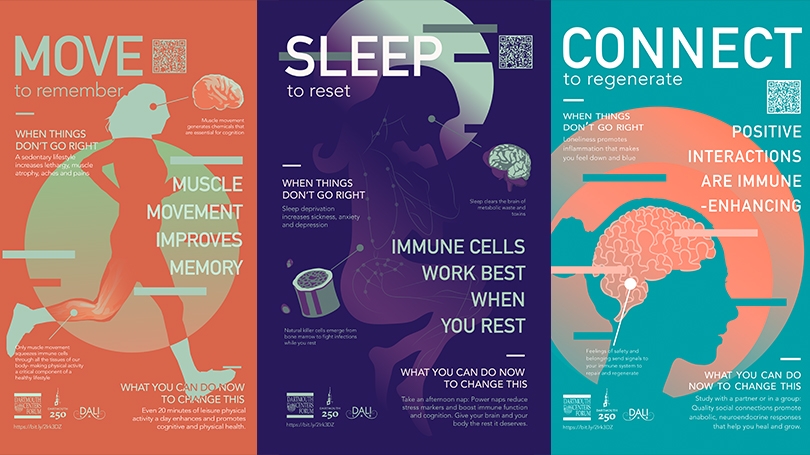
Move Sleep Connect
- About
- Primary Care
- Counseling
- Pharmacy
- Fees & Insurance
- Medical Records
- Inpatient & Nursing
Back to Top Nav
Back to Top Nav
Back to Top Nav
Back to Top Nav
Back to Top Nav
Back to Top Nav
Back to Top Nav
It’s a Balancing Act: Public health and epidemiologic research are validating powerful truisms: lack of sleep, muscle movement, and meaningful connections threaten our well-being. This essential knowledge is reflected in literature and ancient cultural wisdom.
Shakespeare’s Macbeth knew the blessings of a good night’s rest, yet how many know that adaptive immune cells emerge from bone marrow to fight infections while you rest? Or that only muscle movement squeezes surveillance cells through all the tissues of our body- making physical activity a critical component of a healthy lifestyle? And native cultures revere interconnectedness above all- exemplified in the Lakota expression Mitákuye Oyás’iŋ, “All Are Related.” Yet how many, striving for independence and autonomy, fight loneliness and are deprived of the stress reducing, regenerative benefits of connection?
All of us are challenged by balancing lifestyle choices to ward off stress, some are more motivated than others to MOVE, SLEEP and CONNECT.
The aim of this poster campaign is to encourage healthy behavior inspired by public health relevant biology with balanced sources of knowledge- old and new, and across different disciplines, to envision improved well-being for us all.
A sedentary lifestyle increases lethargy, muscle atrophy, aches and pains.
Muscle movement generates chemicals that are essential for cognition.
Only muscle movement squeezes immune surveillance cells through all the tissues of our body to scan for infection or damage- making physical activity a critical component of a healthy lifestyle that improves mood and cognition.
Take a study walk with a classmate to review for a test. Even 20 minutes of leisure time physical activity a day reduces risk of depression and promotes cognitive and physical health.
Walk around Occom pond takes 15 minutes and it is 15 minutes from the Dartmouth Green- So once around can double the minimum recommendation for daily movement!
Walk trails in and around main campus
Sleep deprivation increases sickness, anxiety and depression
Adaptive immune cells emerge from bone marrow to fight infection while you rest
Sleep clears the brain of metabolic waste and toxins
Healthy sleeping habits and afternoon naps can facilitate cognitive and emotional health.
Take an afternoon nap: Power naps reduce stress markers and boost immune function, mental health and cognition. Give your brain and your body the rest it deserves.
Access to sleep specialist at Dick's House
Loneliness promotes inflammation that makes you feel down and blue
Feelings of safety and belonging send signals to your immune system to repair and regenerate
Meaningful social connections are as beneficial to wellbeing as low blood pressure and healthy weight. Meaningful doesn't only mean connections with people you know. Crack a joke with the person standing next to you in line. Remember-laughter is the best medicine!
Eat with others, join a club, or if you’re lacking motivation, the Student Wellness Center is the place to find support!
https://students.dartmouth.edu/wellness-center/
This project was supported by a mini-grant from the Dartmouth Centers Forum which adopts the Envisioning the World We Want theme in concert with the Dartmouth 250th Anniversary in celebration of the past 250 years at Dartmouth, “Honoring Our Past; Inspiring Our Future”.
Awarded to Rebecca T. Emeny and Varahi Trivedi with Parastoo Bassiri, Fiona McEnany and Karen L. Ashley (TDI), Mira Ram, Lucy Li, Regina Yan and Natalie Jung (DALI lab), Ann C. Bracken, and Virginia Brack (Dartmouth College Health Service) and Caitlin Barthelmes (Student Wellness)